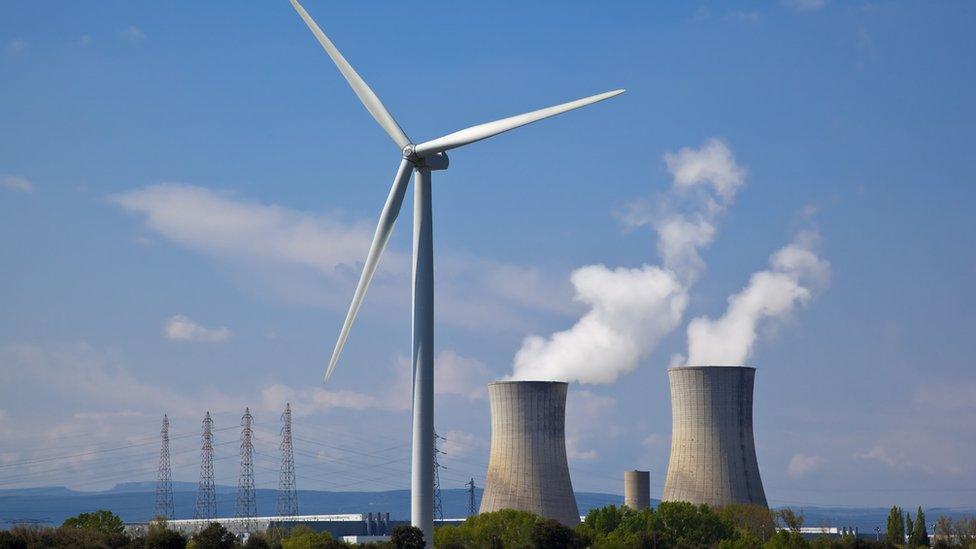Energy strategy: UK plans new nuclear reactors to boost production
- Published
- comments

A nuclear station and wind turbine
The government has published its delayed energy plans, which aims to boost the production of power here in the UK.
The plan aims to increase renewable energy sources, like wind and solar power, and cut back on oil and coal power - especially from abroad.
A big part of the plan is to increase the amount of UK energy that is made in nuclear power stations - with up to eight new nuclear reactors by the end of the decade.
There's also an ambition for offshore wind to power all UK homes by 2030.
Prime Minister Boris Johnson said the plans were "bold" and would lead to cheaper bills.
But the rival Labour Party said the plan would do nothing to help the rising energy costs faced by households right now.
What are the new energy plans?
An engineer inspects a turbine in a nuclear power station
Under the government's fresh plans, the UK will aim to produce up to 24 gigawatts (GW) of electricity by 2050 coming from nuclear power, 25% of the predicted electricity demand needed.
It is hoped the focus on nuclear power will deliver up to eight new reactors.
Electricity is made from the energy that is released when the atoms of radioactive minerals, such as uranium, are split apart in nuclear reactors.
Burbo Bank Offshore Wind Farm near Liverpool
On offshore wind turbines, the plan details the goal of producing up to 50GW of energy by 2030.
The Department for Business, Energy and Industrial Strategy (Beis) said this would be more than enough to power every home in the UK.
The government also aims to double its goal of low carbon hydrogen production to 10GW by 2030, with at least half of that coming from green hydrogen.
Wind power or wind energy is the process that uses wind to make electricity.
Wind turbines turn the kinetic energy - caused by movement made by the wind - into mechanical power.
This mechanical power can be used for specific tasks (such as grinding grain or pumping water), or can be converted into electricity by a generator.
A wind farm on the outskirts of the Lake District
Big plans to create more wind farms on land have not been included.
Although it is one of the cheapest forms of energy, new onshore wind projects have been declining since 2015 when the government introduced stricter planning rules in response to some complaints that wind turbines were an eyesore and noisy.
Using renewables - often called 'green energy' - is better for the environment as it doesn't produce the same levels of emissions that can lead to climate change as using fossil fuels and it also doesn't use up the Earth's resources in the same way.
However, the government has said there are also plans to boost oil and gas projects in the North Sea above Scotland.
We need to protect ourselves from price spikes in the future by accelerating our move towards cleaner, cheaper, home-grown energy.
What has the reaction been to the energy strategy?
Critics say the plans won't help lower electricity bills for homes across the UK
UK energy prices have been rising for months due to growing demand as Covid restrictions are eased.
But the Russian invasion of Ukraine pushed costs up even further.
Although only 8% of UK oil and 5% of gas supplies come from Russia, it is still affected by rising prices worldwide and household bills have come under pressure.
Business Secretary Kwasi Kwarteng said: "The simple truth is that the more cheap, clean power we generate within our borders, the less exposed we will be to eye-watering fossil fuel prices set by global markets we can't control."
These decisions will force households to pay hundreds of pounds more for their energy bills and keep the UK dependent on imported gas for longer.
But Ed Miliband, Labour's shadow climate change and net-zero secretary, said: "This relaunch will do nothing for the millions of families now facing an energy bills crisis."
Liberal Democrat leader Sir Ed Davey also described the plans as "utterly hopeless", while the Scottish National Party's Stephen Flynn called it a "missed opportunity".
Dr Simon Cran-McGreehin, head of analysis at the Energy & Climate Intelligence Unit, told the Â鶹ԼÅÄ that he also felt "underwhelmed" following the announcement.
"This is an immediate problem that needs solutions now, and this doesn't do anything on prices," he said.
- Published15 November 2023
- Published6 October 2020
- Published11 May 2019
